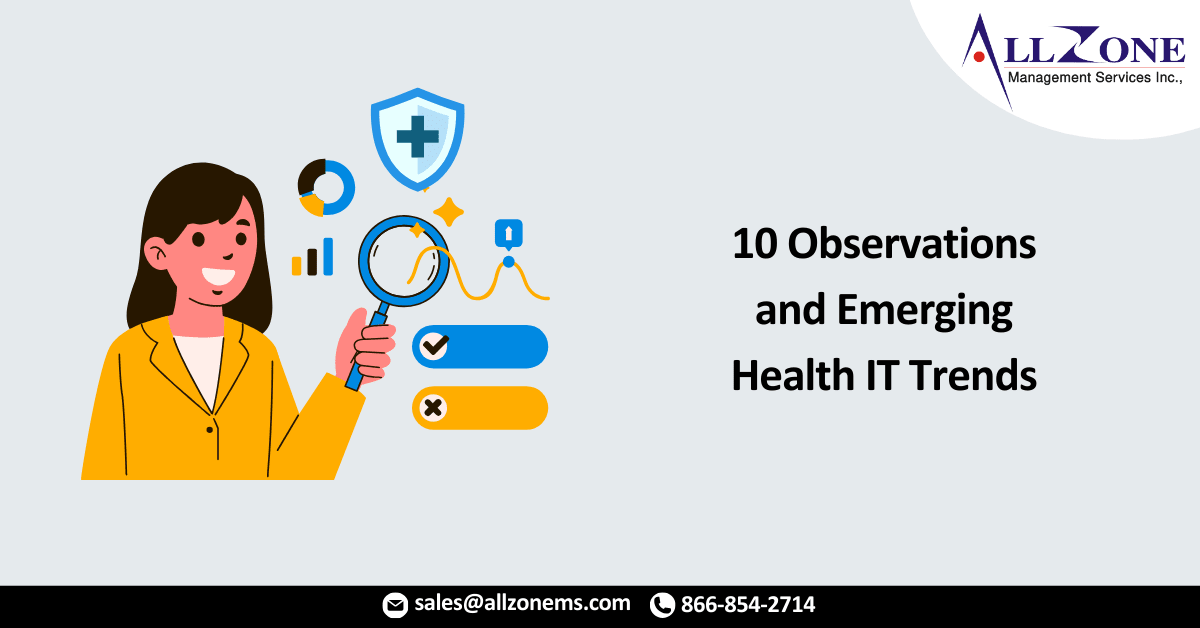Digital transformation accelerated in the last few years and CIOs have elevated responsibility as strategic business leaders for their organizations.
Learn how CIOs are thinking about their role, and building teams, at the Becker’s 7th Annual Health IT + Digital Health + RCM event in Chicago, Oct. 4 to 7. The event brought together thousands of IT and revenue cycle executives to discuss big ideas and share insights into how they’re tackling complex challenges. With the beautiful Lake Michigan right outside, executives gathered at Navy Pier in Chicago to have invigorating conversations about what’s ahead in health IT.
The talent, experience and passion each speaker brought to sessions at the four-day event awes everyone around, and leaders were inspiring in one-on-one conversations between panels.
Here are the top 10 takeaways from the event.
- Healthcare dollars are precious and digital technology spending is heavily scrutinized. But health systems are still investing in technology aligning with core business strategy in areas such as staffing, patient experience, revenue cycle, cyber security and clinician burnout. Top executives are willing to consider technology with meaningful and metrics-driven return on investment, especially as they plan for more value-based and consumer-driven care in the future.
- Many health systems are still in the process of finding the right mix of in-person and virtual care, but patients overwhelmingly want telehealth options. While payers may lower telehealth reimbursement, health systems are still focused on building out virtual and hospital at home programs to bridge access to care gaps and deliver convenient care. The financials around virtual care remain difficult, and likely won’t get easier until health systems are operating with primarily value-based contracts.
- Almost all health systems are having trouble recruiting and retaining IT talent, and cyber security talent in particular. Some health systems are partnering with recruiting firms while others are finding creative ways to promote from within. In some cases, CIOs and CISOs are identifying individuals working in the help desk, nursing departments or other areas with the aptitude to learn the technical skills needed to support the hospital’s IT team.
- Patient experience has become a priority, if not the top priority, of CIOs and chief digital officers to compete with disruptors like Amazon and Walmart that have a great reputation for consumer satisfaction. Large tech companies and retailers are deepening their reach into healthcare with recent acquisitions focused on virtual and primary care, making patients less tolerant of a rocky experience; they demand a smooth and seamless care journey, and aren’t afraid to switch providers until they find it.
- A big opportunity for disruptors, including Amazon, Optum, Walmart and CVS Health could be Medicare Advantage. There remain big opportunities and spending with Medicare Advantage programs, and MA plans would be a significant addition to any company’s healthcare portfolio.
- IT departments have to embrace a “yes” culture. The old culture of gate keeping what’s possible and turning down requests is no longer acceptable in healthcare. Instead, forward-thinking CIOs are changing expectations for team members to take a more open-minded approach and work with other departments to solve complex problems. The culture shift might mean losing IT team members who aren’t onboard, but the organization is stronger for it.
- Health systems are transitioning to the cloud, some with one big move including EHRs while others are taking more of a piecemeal approach. The cloud offers benefits for data management and storage, cyber security and more. But not all applications are able to transition, which can make the process challenging, especially for organizations with significant technical debt. The ability of new applications and start-ups to operate in the cloud and integrate with the major EHRs is essential.
- CEOs and hospital boards understand the need for high quality cyber security now more than ever, and are willing to invest in two-factor authentication, email protection, cyber security liability insurance and more to manage risk. Health systems, large and small, are also increasingly taking a hybrid approach to in-house and contracted cyber security expertise to quickly flex up personnel during an attack. For vendors, a great understanding of healthcare is paramount for CIOs when selecting partners; just working in federal government security isn’t enough.
- Natural language processing would make a big difference in clinician burnout, but is currently cost prohibitive for many hospitals. When the technology becomes more mature and further integrated into existing technology platforms, hospitals and health systems will jump at the chance to have NLP in exam and operating rooms.
- Artificial intelligence still hasn’t “arrived” in healthcare. And there is debate on whether it ever will in clinical care. AI is being used for automation and operational efficiencies on the business side, and in the digital front door with chat bots, but there is still a lot of potential for meaningful AI. In clinical care, AI shows the biggest potential with medical imaging and diagnostics. The technology won’t replace physicians, but physicians enabled by AI will replace physicians without it, we heard. There are also huge opportunities for AI-enabled robots to complete simple tasks, such as hospital deliveries, similar to how robots are used in hotels, warehouses and more.
For More Information: 10 observations and emerging health it trends.html

